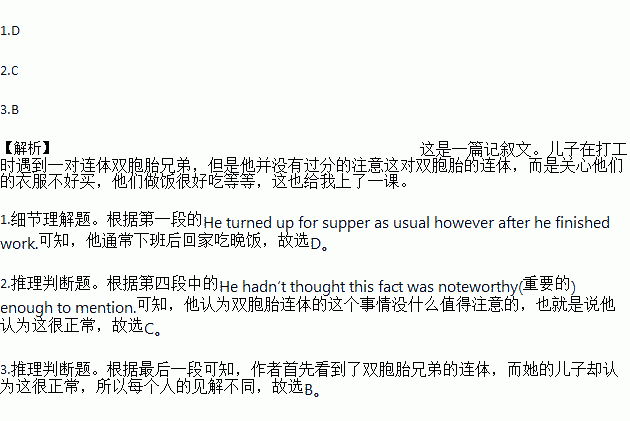ÌâÄ¿ÄÚÈÝ
When my son was 11 years old, he got a small job helping out with a traveling carnival in our town. He didn¡¯t come home at lunch time, phoning instead to tell me he was fine and had found a few days¡¯ work helping out at an exhibit. He turned up for supper as usual however after he finished work.
I asked him how he had managed at lunch and he told me he had made some new friends at the carnival, some young men who were twin brothers, and their mom and dad. They had paid him a few dollars and invited him for lunch in return for helping them set up their exhibit and wanted him to return the next day to help with other chores (ÔÓÎñ).
I was glad he had found new friends but a little worried about the type of people who might be traveling in a carnival. "Oh, Mom, these are just normal everyday people like anyone else. They just work at a carnival instead of in a store or something". "Come down tomorrow and meet them yourself," he said.
So the next day I went to the carnival and to the exhibit he had directed me to. The twin brothers turned out to be Siamese (Á¬ÌåµÄ) twins, joined at the chest. He hadn¡¯t thought this fact was noteworthy(ÖØÒªµÄ) enough to mention. When I brought it to him, he said, "Yes, I noticed that too. Do you know that their mom has to make all their clothes because it¡¯s so difficult to find anything to fit them? They¡¯re also really good cooks. Today, Joe, the one on the right, made me spaghetti (Òâ´óÀûÃæÌõ) for lunch."
What others see first in a person is not what a child considers important. Where I saw Siamese twins, he saw people having difficulty buying clothes that fit, and young men who were good cooks. It was a lesson I have thought about many times over the years.
1.From the first paragraph we know that ______.
A. The author¡¯s son could live on his job at the exhibit
B. The author¡¯s son was good at communicating with others
C. The author¡¯s son disliked meeting his parents at home
D. The author¡¯s son usually made his appearance at supper
2.In the boy¡¯s eyes, the Siamese twins were ______.
A. people who had no suitable clothes to wear
B. good cooks with strange appearance
C. just normal people
D. more friendly and kinder than normal people
3.Which proverb may the author agree with according to the last paragraph?
A. Don¡¯t judge a person by his looks. B. It is a matter of opinion
C. Love me, love my dog. D. It¡¯s never too late to learn.


 ____on the faces of the performe
____on the faces of the performe rs. ____, what we were able to appreciate was the wonderful panorama(È«¾°) of the ____. At the second show, we sat in the second row, just a couple of meters from the stage and we could ____the performers¡¯ expressions carefully. Having seen the show before, we expected to see our favorite______again.
rs. ____, what we were able to appreciate was the wonderful panorama(È«¾°) of the ____. At the second show, we sat in the second row, just a couple of meters from the stage and we could ____the performers¡¯ expressions carefully. Having seen the show before, we expected to see our favorite______again.